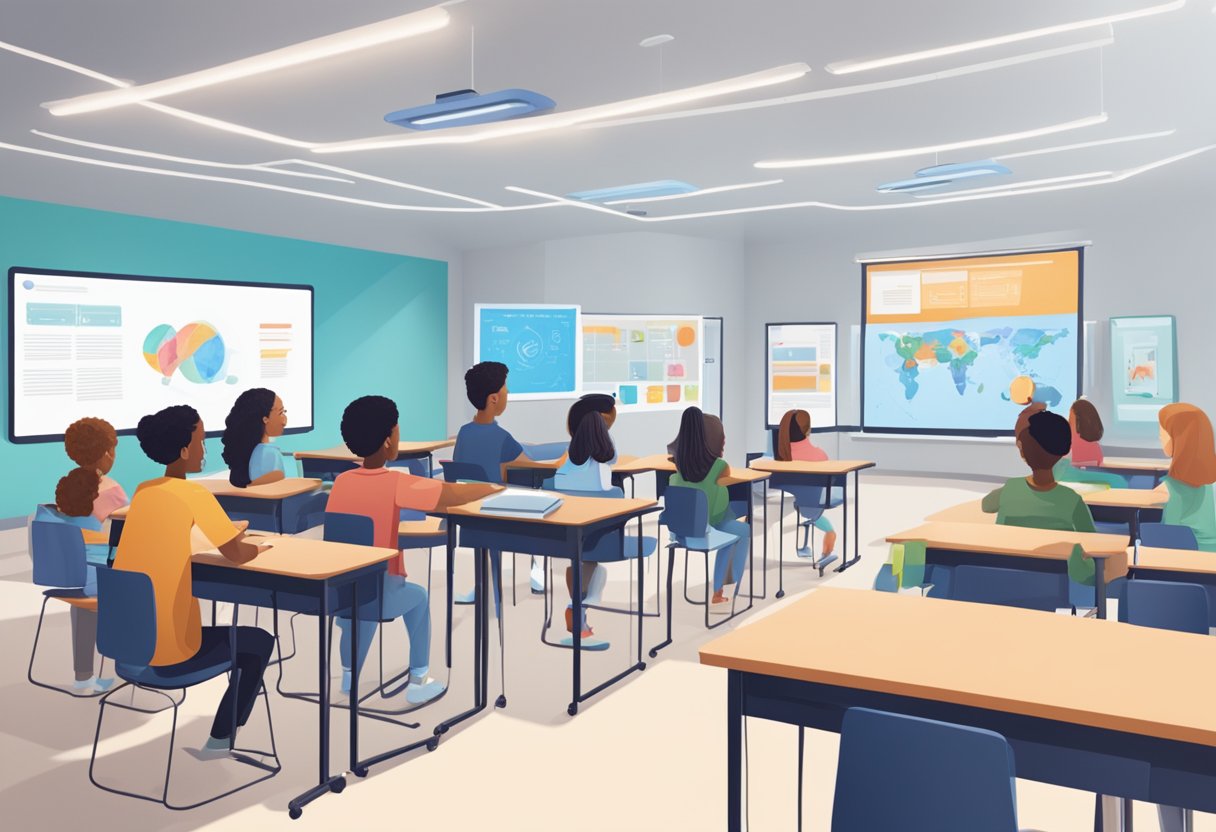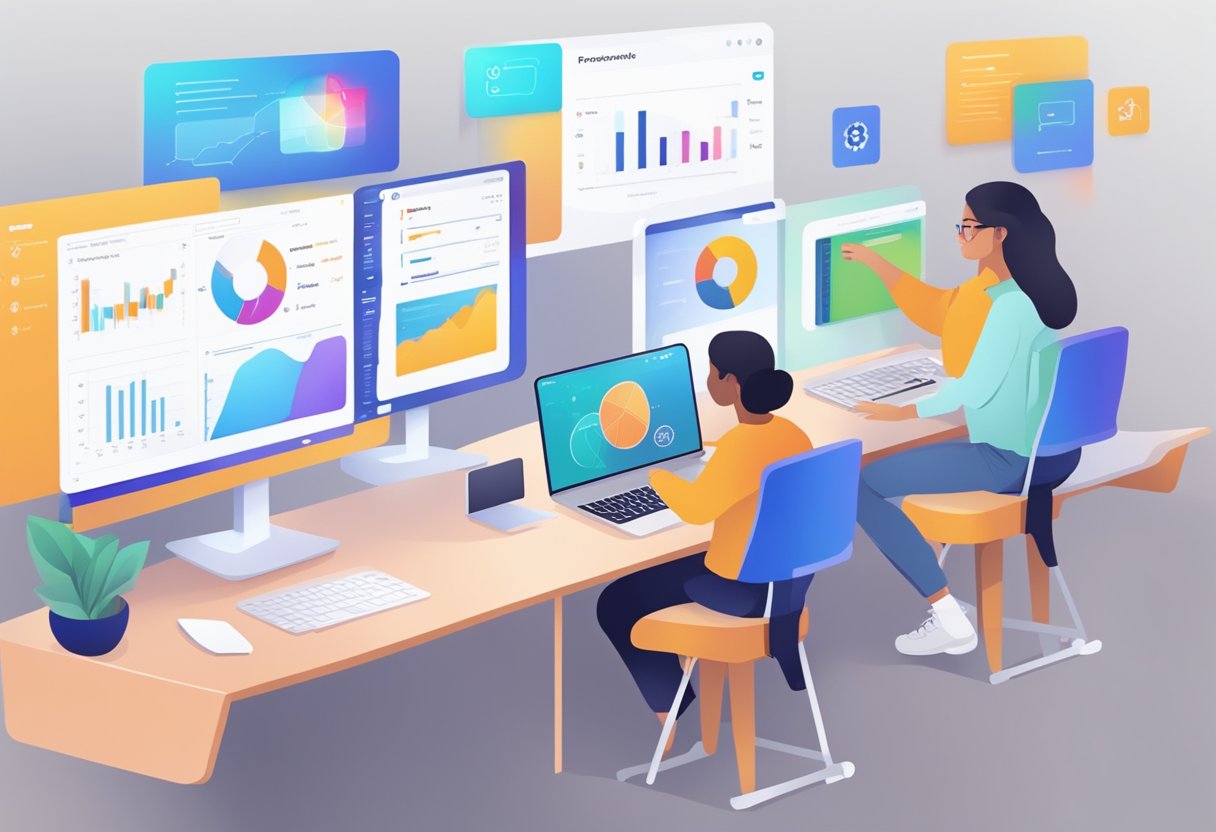Personalized learning has been a topic of discussion in the education system for many years. It is an approach to education that tailors the learning experience to meet the unique needs of each student.
With the advancements in technology, artificial intelligence (AI) has emerged as a promising tool to enhance personalized learning. AI-enhanced platforms can analyze data and provide insights into the learning process, which can help educators and students to personalize the learning experience.
One of the key benefits of AI in personalized learning is that it can provide adaptive learning experiences. Adaptive learning platforms can analyze data on student performance and adjust the learning experience to meet the unique needs of each student.
This can help students to learn at their own pace, which can improve their engagement and motivation.
Additionally, AI can provide personalized feedback to students, which can help them to identify areas where they need to improve and provide suggestions on how to improve.
Another benefit of AI in personalized learning is that it can enhance educator and student engagement. AI can provide educators with insights into student performance, which can help them to identify areas where students are struggling and provide targeted support.
This can help educators to personalize the learning experience and improve student outcomes.
Additionally, AI can provide students with personalized feedback and suggestions, which can help them to stay engaged and motivated.
Key Takeaways
- AI-enhanced platforms can provide adaptive learning experiences that can improve student engagement and motivation.
- AI can enhance educator and student engagement by providing insights into student performance and providing targeted support.
- While AI has many benefits in personalized learning, there are also challenges and ethical considerations that need to be addressed.
The Evolution of Personalized Learning
From Traditional to AI-Enhanced Methods
Personalized learning has been around for a long time, but it has evolved significantly in the past few years.
Traditional methods of personalized learning involved teachers tailoring their lessons to meet the needs of individual students. This approach was time-consuming and often resulted in a one-size-fits-all approach that did not meet the needs of all students.
With the advancement of technology, personalized learning has become more innovative. AI-enhanced platforms are now being used to provide students with a more personalized learning experience.
These platforms use algorithms to analyze student data and provide customized learning paths for each student.
The Role of AI in Education
AI technology is becoming increasingly prevalent in education.
AI-enhanced platforms have the potential to revolutionize the way students learn. They can provide personalized learning experiences that are tailored to each student’s needs, interests, and learning style.
AI-enhanced platforms can also provide teachers with valuable insights into student learning.
They can analyze student data to identify areas where students are struggling and provide teachers with suggestions for how to address these issues.
In addition, AI-enhanced platforms can help students stay engaged and motivated.
They can provide interactive experiences that make learning more fun and engaging. This can help students stay focused and motivated, which can lead to better learning outcomes.
Key Benefits of AI in Personalized Learning
AI-enhanced platforms have shown immense promise in personalizing learning experiences for students. The following are some of the key benefits of AI in personalized learning.
Adaptive Learning Environments
Adaptive learning environments are designed to provide students with personalized learning experiences.
AI-powered platforms can analyze student data to identify their strengths and weaknesses and provide them with targeted learning material.
This enables students to learn at their own pace and in a way that suits their learning style.
Adaptive learning environments can also help teachers to identify struggling students and provide them with additional support.
Customized Learning Pathways
AI-powered platforms can provide students with customized learning pathways.
These platforms can analyze student data to identify their interests and learning goals and provide them with learning material that is tailored to their needs.
Customized learning pathways can help students to stay engaged and motivated by providing them with content that is relevant to their interests.
Improved Learning Outcomes
AI-powered platforms can improve learning outcomes by providing students with targeted feedback.
These platforms can analyze student data to identify areas where they are struggling and provide them with feedback that is tailored to their needs.
This can help students to identify their weaknesses and work on improving them.
Additionally, AI-powered platforms can provide students with real-time feedback, which can help them to stay engaged and motivated.
Enhancing Educator and Student Engagement

Empowering Educators with AI Tools
The integration of AI in education has opened new opportunities and possibilities for educators to enhance their teaching methods.
AI-powered tools such as chatbots, virtual tutors, and adaptive learning platforms can help educators personalize learning experiences and engage students more effectively.
By employing these tools, educators can automate routine tasks, streamline grading, and provide real-time feedback to students.
Moreover, AI-powered tools can help educators identify students who are struggling and provide them with personalized support.
For instance, chatbots can answer students’ questions and provide feedback on their assignments. Virtual tutors can provide one-on-one support to students, helping them to understand complex concepts and improve their skills.
Promoting Student Engagement and Inclusivity
AI-enhanced platforms can also promote student engagement and inclusivity in the classroom.
By personalizing the learning experience, AI-powered tools can help students learn at their own pace and provide them with content that matches their interests and learning style.
This can help to keep students engaged and motivated, leading to better learning outcomes.
Furthermore, AI-powered tools can help to promote inclusivity by providing support to students with different learning needs.
For instance, adaptive learning platforms can adjust the difficulty level of the content based on the student’s performance. This can help to ensure that all students are challenged at an appropriate level and can learn effectively.
Challenges and Ethical Considerations
Addressing the Digital Divide
One of the significant challenges in implementing AI-enhanced platforms in personalized learning is the digital divide.
The digital divide refers to the gap between those who have access to technology and those who do not.
The use of AI-enhanced platforms in personalized learning requires students to have access to technology and the internet. However, not all students have access to these resources, which could widen the gap between the haves and have-nots.
To address this issue, schools and policymakers need to ensure that all students have access to technology and the internet.
This could be achieved by providing students with laptops or tablets and ensuring that schools have Wi-Fi connectivity. Additionally, policymakers could work to provide internet access to low-income families.
Responsible AI in Education
Another significant challenge in implementing AI-enhanced platforms in personalized learning is ensuring that the AI used is responsible and ethical.
AI systems can perpetuate biases and stereotypes, which could result in inequitable outcomes for students. Moreover, AI systems could compromise student privacy and data security.
To address these issues, schools and policymakers need to ensure that the AI used in personalized learning is responsible and ethical.
This could be achieved by implementing guidelines and standards for the use of AI in education. Additionally, schools could provide digital literacy training to students to help them understand how AI works and its potential impact on their lives.
The Future of AI in Education
Artificial Intelligence (AI) has been transforming the education sector by providing personalized learning experiences to students.
The integration of AI in education has the potential to revolutionize learning and teaching, paving the way for a more equitable and effective educational system.
AI models can use data about a learner’s performance, preferences, and history to customize unique, tailored educational experiences.
Preparing for Industry 4.0
The fourth industrial revolution, Industry 4.0, is characterized by the integration of digital technologies into all aspects of life.
AI-enhanced education can prepare students for the demands of Industry 4.0 by providing them with the skills and knowledge they need to succeed in a digital world.
AI models can analyze big data to identify trends and patterns, which can help educators design curricula that are relevant and up-to-date.
Transformative Education and Lifelong Learning
The integration of AI in education can also promote transformative education and lifelong learning.
Transformative education is an approach that aims to empower learners to think critically and creatively, to question assumptions, and to challenge the status quo.
AI-enhanced platforms can provide learners with personalized feedback and support, which can help them to develop the skills they need to become independent, self-directed learners.
Lifelong learning is the idea that education is a lifelong process that does not end when one leaves formal education.
AI-enhanced platforms can support lifelong learning by providing learners with access to high-quality educational resources that are tailored to their needs and interests.
AI models can analyze learners’ performance data to identify areas where they need additional support or challenge, and can provide them with personalized learning experiences that are engaging and effective.



